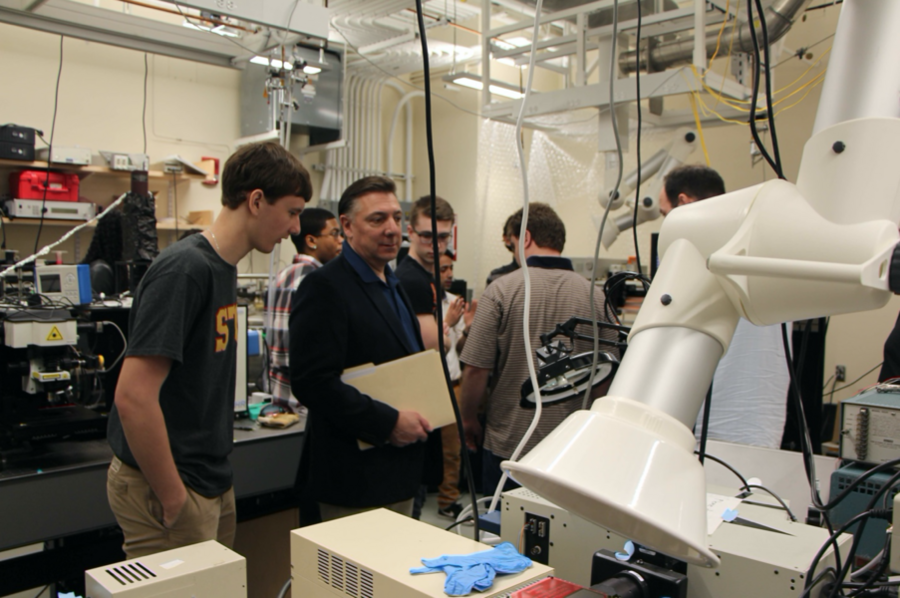MIT to share in $3.2 million grant to create a statewide technician-training program in advanced manufacturing
At the end of October, the Commonwealth of Massachusetts announced it won a $3.2 million, two-year grant, in collaboration with MIT, community colleges, and state agencies, to prepare workers for stable high-paying jobs in advanced manufacturing. The program, called MassBridge, will create a curriculum that bridges between the Commonwealth’s excellent traditional manufacturing education and the advanced manufacturing needs of today’s economy. Massachusetts will serve as a foundry and pilot for this curriculum, which can later be used by other states to meet the nation’s growing need for these skills.
Manufacturing is sometimes seen as an unattractive industry for work, where jobs are dirty, dull, and dingy. But the new wave of advanced manufacturing — in areas like robotics, photonics, and 3D printing — are a completely different experience. These are well-paid “middle-skill” jobs that can provide stable employment, good working conditions, and opportunities for advancement. Some estimates say that more than 2 million of these jobs will go unfilled over the next decade. Potential workers need to know about the opportunities, and educational institutions need to build programs that prepare people for these careers.
When the U.S. Department of Defense’s Manufacturing Technology office first considered working with a state on middle-skill worker training, the Massachusetts Technology Collaborative, or MassTech, quickly put together a plan. The commonwealth had many elements that made it a strong candidate. Massachusetts had created four regions — Northeast, Southeast, Central, and Western Massachusetts — which worked together to standardize training across the commonwealth. The governor’s skills cabinet coordinated training-related activities across the many branches of state government. And finally, the commonwealth had already committed $100 million in capital equipment grants to support the defense department’s Manufacturing-USA institutes.
Workforce training activities for one of these institutes, AIM Photonics, is led by MIT Professor Lionel Kimerling. Kimerling’s group IKIM (Initiative for Knowledge and Innovation in Manufacturing) had already won an Office of Naval Research grant to develop technician-training programs in robotics and photonics, and IKIM was also developing online classes. MassTech enlisted IKIM’s help.
Since the program will rely extensively on digital learning modules, MassTech also turned to the MIT Office of Open Learning (OL). MIT OL has extensive expertise in digital education and learning science. It also has an ongoing commitment to workforce learning through its Abdul Latif Jameel World Education Lab and several educational programs.
“This award is an important national acknowledgment of Massachusetts’ successes in manufacturing and the competitive training programs that support our industry,” says Secretary Mike Kennealy of the Executive Office of Housing and Economic Development. “The grant from the Department of Defense presents a major opportunity to supercharge our manufacturing sector by engaging new students and adult learners, and helping them develop their skills to better succeed in these emerging industries.”
MIT’s IKIM and OL will be involved in almost all aspects of the MassBridge project, and they will lead the work on skills roadmapping and curriculum benchmarking. “MIT is well-known for its deep expertise in engineering. We are also known for the pioneering work we’ve done in digital and blended learning. We see our mission as educating not only our students, but also outside MIT,” says Professor Sanjay Sarma, vice president of open learning. “Combining the expertise of MIT, the Commonwealth, and our community college collaborators can make a real difference in the lives of people who do not yet have the skills for well-paying and fulfilling careers.”
“The Commonwealth of Massachusetts has a clear vision for recovery of its manufacturing sector by leveraging its science and engineering leadership,” says Kimerling. “MassTech has been a valued partner for MIT, identifying a strong technician workforce as the missing ingredient to success. Our team is privileged and delighted to share our advanced manufacturing knowledge and to engage with outstanding students and faculty in building the vital technician workforce.”
Other collaborators in the program team include Cape Cod Community College, Quinsigamond Community College, Massachusetts Manufacturing Extension Program, Massachusetts hiring boards, and representatives from state government and the Department of Defense. After initially building and testing the curriculum in Massachusetts, the team plans to make the curriculum available nationwide to any states that wish to adopt it.

